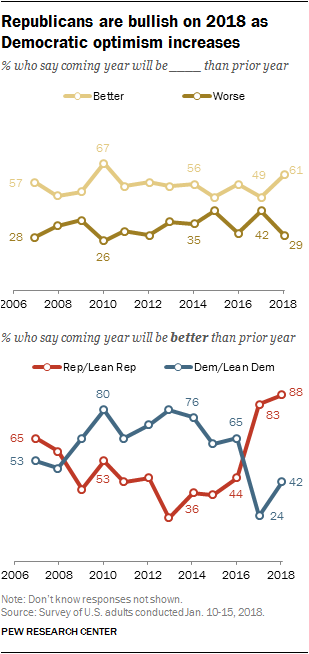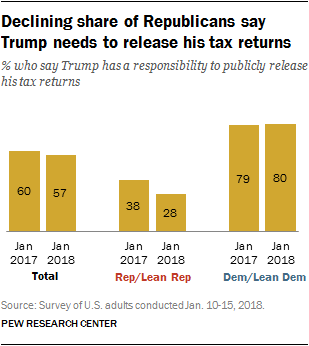 A majority of Americans say 2018 will be a better year than 2017, a shift from a year ago when public expectations were far less positive. The change has been driven almost entirely by Democrats, who are more likely than Republicans to cite this fall’s midterm elections as a reason for optimism. And significantly more Democrats than Republicans say they are “looking forward” to the elections.
A majority of Americans say 2018 will be a better year than 2017, a shift from a year ago when public expectations were far less positive. The change has been driven almost entirely by Democrats, who are more likely than Republicans to cite this fall’s midterm elections as a reason for optimism. And significantly more Democrats than Republicans say they are “looking forward” to the elections.
Donald Trump begins the year with a job approval rating of 37%, which is little different from his rating shortly after his inauguration last year (39%). Large majorities continue to view Trump negatively on such traits as being trustworthy, well-informed, empathetic and even-tempered.
As was the case last year, one of Trump’s stronger traits is his ability to get things done; 50% say he is able to do this. But on what had been his most positive characteristic a year ago – keeping his promises – Trump is now viewed more critically. Just 39% say Trump keeps his promises, down from 60% last February. The decline has come among members of both parties, though Republicans continue to be much more likely than Democrats to say Trump keeps his promises.
The new national survey by Pew Research Center, conducted Jan. 10-15 among 1,503 adults, finds that 61% of the public thinks this year will be better than last year; a year ago, 49% said 2017 would be better than 2016. Optimism among Republicans and Republican-leaning independents remains very high (88% expect this year will be better than last) and has increased substantially among Democrats and Democratic leaners (from just 24% last year to 42% today).
Republicans and Democrats who see a better year ahead differ markedly in their reasons for saying this: 36% of Republicans cite the economy, jobs or the stock market for why 2018 will be better, while 23% cite Trump or his policies. Among Democrats who think this year will be better, 26% say they are generally optimistic, while 18% mention the midterm elections. Fewer than 1% of Republicans point to the midterms as why they think 2018 will be better than last year.
Among the 29% of Americans (mostly Democrats) who say 2018 will be worse than 2017, Trump figures prominently among the reasons for their negative expectations. Roughly half (46%) point to Trump or his policies as why they think this year will be worse than last year; no other response comes close (11% cite Republican policies).
 At the start of the election year, Democratic registered voters, are more likely than Republican voters to say they are looking forward to the midterms – a shift from the past two midterm elections.
At the start of the election year, Democratic registered voters, are more likely than Republican voters to say they are looking forward to the midterms – a shift from the past two midterm elections.
Currently, 69% of Democratic registered voters say they are looking forward to the midterms, compared with 58% of Republicans. At this point in 2014, Republicans were 12-percentage points more likely than Democrats to say they were anticipating the election and the gap was comparable early in 2010 (15 points).
Liberal Democrats, in particular, are looking forward to the midterms: 83% say that today, compared with 59% in 2014 and 48% in 2010. By contrast, 61% of conservative Republicans say they are looking forward to the midterms, lower than in 2014 (74%) or 2010 (72%).
As other national surveys have found, Democrats have an early advantage in voting preferences for the midterm elections: 53%of registered voters say if the election were held now, they would vote for the Democrat in their House district or lean toward the Democrat, while 39% favor the Republican or lean Republican.
 With the election about 10 months away, a majority of registered voters (63%) say the issue of which party controls Congress will be a factor in their vote this year. This is a greater percentage than said this at early points in the 2014, 2010 and 2006 midterm cycles. The share saying partisan control of Congress will matter in their vote is now about as high as it was in the closing weeks of those elections.
With the election about 10 months away, a majority of registered voters (63%) say the issue of which party controls Congress will be a factor in their vote this year. This is a greater percentage than said this at early points in the 2014, 2010 and 2006 midterm cycles. The share saying partisan control of Congress will matter in their vote is now about as high as it was in the closing weeks of those elections.
Majorities of both Democratic (68%) and Republican voters (62%) say the issue of which party controls Congress will be a factor in their vote in the midterms. Democrats, in particular, are more likely to view partisan control as important than at roughly this point or later in the past three midterm elections.
Other major findings
Little confidence in Trump on issues. As in the past, Trump does not draw a great deal of confidence for his ability to handle many major issues. About half (46%) say they are very or somewhat confident that Trump will make good decisions on economic policy (51% are not too confident or not at all confident). About as many Americans (44%) say they are at least somewhat confident in Trump to work effectively with Congress, while fewer express confidence in Trump on immigration policy (38%) and in his ability to handle an international crisis (35%).
 Fewer Republicans say Trump is obligated to release his tax returns. Nearly six-in-ten Americans (57%) say Trump has a responsibility to publicly release his tax returns, which is little changed from a year ago (60%). However, fewer Republicans say Trump needs to release his returns than did so last year (28% now, 38% then). Democrats continue to overwhelmingly say Trump has an obligation to release his taxes (80% say this).
Fewer Republicans say Trump is obligated to release his tax returns. Nearly six-in-ten Americans (57%) say Trump has a responsibility to publicly release his tax returns, which is little changed from a year ago (60%). However, fewer Republicans say Trump needs to release his returns than did so last year (28% now, 38% then). Democrats continue to overwhelmingly say Trump has an obligation to release his taxes (80% say this).
Anti-incumbent sentiment again high. In the past two midterm elections, anti-incumbent sentiment was at a historical high. That remains the case this year: Just 25% of voters say they would like to see most representatives re-elected and only about half (48%) say they want their own representative to be re-elected. Anti-incumbent sentiment is more widespread among Democrats than Republicans. Fewer than half of Democrats say they want their own representative returned to Congress, compared with 55% of Republicans.
Education a major factor in midterm voting intentions, especially among whites. Deep educational differences among white voters, which increased considerably in the 2016 election, are already stark in early voting intentions for Congress. Among white voters with a postgraduate degree, 65% favor the Democrat in their House district or lean Democratic; among white voters with a four-year degree, 53% say the same. White voters with some college experience but no degree favor the Republican by a 48%-42% margin. And whites with no college experience favor the Republican by more than two-to-one (65% to 28%).


